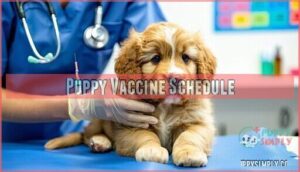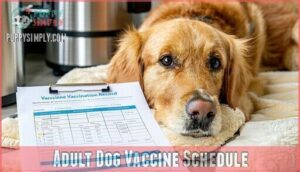This site is supported by our readers. We may earn a commission, at no cost to you, if you purchase through links.

You’ll need core vaccines like rabies, distemper, and parvovirus for dogs, plus rabies, distemper, and calicivirus for cats.
Puppies and kittens start their vaccine series around 6-8 weeks old, with boosters every 3-4 weeks until 16 weeks.
Adult pets receive annual or triennial boosters depending on the vaccine type.
Your vet may recommend additional non-core vaccines based on your pet’s lifestyle and regional disease risks.
Vaccination isn’t just about individual protection—it creates community immunity that shields vulnerable animals.
The specific timing and combinations can make or break your pet’s protection plan.
This emphasizes the importance of a well-planned vaccination schedule for optimal pet’s protection.
Table Of Contents
- Key Takeaways
- Pet Vaccination Needs
- Vaccination Schedules
- Benefits of Pet Vaccines
- Vaccine Preventable Diseases
- Post Vaccination Care
- Frequently Asked Questions (FAQs)
- What vaccinations do pets really need?
- How often should a pet be vaccinated?
- What is the 7 and 1 vaccine for dogs?
- What vaccines are routine for dogs?
- Are there any alternatives to traditional vaccinations for pets?
- Can my pet receive multiple vaccines at the same time?
- Are there any vaccines that are recommended for all pets, regardless of their lifestyle or location?
- Can pregnant pets receive vaccines safely?
- How long do vaccine antibodies last?
- Are there alternatives to traditional injected vaccines?
- Conclusion
Key Takeaways
- Start your puppy’s vaccine series at 6-8 weeks and don’t skip boosters – Your pet needs multiple doses every 3-4 weeks until it is 16 weeks old because maternal antibodies can interfere with protection
- Core vaccines aren’t optional – they’re legally required and life-saving – You’ll need rabies, distemper, and parvovirus for dogs, plus rabies, panleukopenia, herpesvirus, and calicivirus for cats, regardless of lifestyle
- Vaccination saves you thousands in emergency vet bills – You’ll spend $200-400 annually on vaccines versus $1,500-5,000 treating diseases like parvovirus or distemper
- Watch for mild side effects but don’t panic – Your pet might experience soreness or lethargy for 24-48 hours after shots, but serious reactions are rare and most pets recover quickly
Pet Vaccination Needs
Your pet’s vaccination needs depend on their age, lifestyle, and risk factors.
Core vaccines protect against serious diseases that all pets should receive, while non-core vaccines are recommended based on your pet’s specific exposure risks and living situation, including their lifestyle.
Core Vaccines for Dogs
Your dog needs core vaccines as their foundation of protection.
The rabies vaccine is legally required in most states, while the DA2PP vaccine shields against distemper, adenovirus types, parvo variants, and parainfluenza.
These dog vaccinations protect against deadly diseases with severe distemper symptoms and dangerous parvo variants that can be fatal without prevention.
Core Vaccines for Cats
Just like dogs, cats need specific core vaccines to stay healthy and protected from serious diseases.
These vaccinations form the foundation of your cat’s preventive healthcare plan.
Here are the 5 core vaccines every cat should receive:
- Feline Panleukopenia (Distemper) – Initial doses every 3-4 weeks until 16-20 weeks, then boosters at one year and every three years
- Herpesvirus Protection – Same schedule as panleukopenia, protecting against upper respiratory infections
- Calicivirus Control – Prevents oral disease and respiratory symptoms with identical timing to other core vaccines
- Rabies Prevention – Single dose as early as 8 weeks, with annual or 3-year boosters depending on regulations
- FeLV Vaccination – Two doses 3-4 weeks apart, then annual boosters for high-risk cats
These cat vaccinations protect against life-threatening diseases.
Kitten vaccinations start early because maternal antibodies fade around 6-8 weeks.
The rabies vaccine is legally required in most areas, while feline distemper vaccines prevent fatal viral infections.
Your vet will customize the schedule based on your cat’s lifestyle and risk factors.
Non-Core Vaccines for Pets
While core vaccines protect against deadly diseases, noncore vaccines tackle regional risks and lifestyle factors.
These individualized vaccination choices depend on your pet’s environment and activities, helping veterinarians create customized protection plans that address specific vaccine efficacy needs and owner concerns.
Veterinarians consider the benefit-risk balance when determining the appropriate vaccination schedule for each animal.
| Vaccine Type | Dogs | Cats |
|---|---|---|
| Respiratory | Bordetella bronchiseptica | Bordetella |
| Vector-borne | Lyme disease, Leptospirosis | Chlamydiosis |
| Viral | Canine influenza | Feline leukemia (FeLV) |
| Lifestyle-based | Rattlesnake toxoid | Feline immunodeficiency virus |
| Risk factors | Boarding, daycare exposure | Outdoor access, multi-cat homes |
Your vet assesses risk factors like travel patterns, social exposure, and geographic disease prevalence to recommend appropriate lifestyle vaccines.
Future vaccines continue expanding protection options for emerging threats.
Vaccination Schedules
Getting your pet on the right vaccination schedule protects them from serious diseases and keeps them healthy throughout their life.
You’ll need different timelines for puppies, adult dogs, and kittens, with core vaccines starting as early as 6-8 weeks old, which is a critical part of their health.
Puppy Vaccine Schedule
Your puppy’s vaccination journey begins around 6 weeks old with a carefully planned schedule.
Puppies receive shots every 2-4 weeks until they’re at least 16 weeks old, though some breeds need vaccines until 20 weeks. Maternal antibodies can interfere with vaccine timing, making multiple doses necessary.
Your puppy needs multiple vaccine doses as maternal antibodies fade—it’s a race against time for protection.
Here’s your puppy vaccine schedule breakdown:
- 6-8 weeks: Start with DAP (distemper, adenovirus, parvovirus) and Bordetella – these combination vaccines protect against multiple diseases at once
- 10-12 weeks: Add DHLPP (includes leptospirosis) plus Lyme and canine influenza based on your area’s risks
- 14-16 weeks: Final DHLPP booster with rabies vaccine – this timing guarantees maximum protection as maternal antibodies fade
Breed variations matter since larger breeds may need extended schedules. Watch for vaccine reactions like lethargy or swelling, which are usually mild. Your vet will adjust timing based on your puppy’s individual needs and local disease risks.
Adult Dog Vaccine Schedule
Your faithful companion’s vaccination journey continues beyond puppyhood.
Adult dogs need core vaccines every three years, while lifestyle boosters require annual attention.
Veterinary consultation helps determine proper vaccine duration for overdue vaccines and specific needs.
| Vaccine Type | Booster Frequency | Risk Factors |
|---|---|---|
| Rabies | 1-3 years (legal requirement) | All dogs |
| Core vaccines (DHP) | Every 3 years | All dogs |
| Bordetella | Annual/6-month | Boarding, grooming |
| Lyme disease | Annual | Tick-endemic areas |
| Leptospirosis | Annual | Wildlife exposure |
The table outlines the different types of vaccines, including Rabies and Bordetella, along with their booster frequencies and associated risk factors.
Kitten Vaccine Schedule
Your kitten’s vaccination schedule starts between six and eight weeks, continuing every three to four weeks until sixteen to twenty weeks old.
Initial doses combat maternal antibodies that interfere with immunity. Core vaccine types include panleukopenia, herpesvirus, calicivirus, and rabies.
Booster timing follows one year later, then every three years. Veterinary consultation guarantees your pet vaccination schedule matches your kitten’s specific needs and lifestyle risks.
Benefits of Pet Vaccines
Vaccinating your pets protects them from serious diseases while saving you money on expensive treatments later.
You’re also helping protect other animals and people in your community from dangerous infections that can spread between species, which is a key aspect of community health.
Disease Prevention
Vaccines serve as your pet’s shield against serious diseases that can cause suffering or death.
**Vaccines are your pet’s first line of defense against deadly diseases that can devastate their health.
These preventive measures work by training your pet’s immune system to recognize and fight specific pathogens before they cause harm.
Here’s how pet vaccinations protect your furry family:
- Vaccine Efficacy – Modern vaccines prevent up to 95% of targeted diseases when administered properly
- Herd Immunity – Widespread vaccination protects entire pet communities, including vulnerable animals
- Zoonotic Diseases – Rabies vaccines prevent transmission of deadly diseases from pets to humans
Global Eradication efforts have eliminated some pet diseases entirely through consistent vaccination programs.
Regular vaccinations are a key part of dog health management.
As Emerging Threats continue to develop, preventative care through vaccines remains your best defense against both known and evolving health risks.
Cost-Effective Measure
Preventative care through pet vaccination represents one of your smartest financial decisions as a pet owner. You’ll save substantially more money than you’ll spend on routine vaccines.
| Scenario | Prevention Cost | Treatment Cost | Your Savings |
|---|---|---|---|
| Parvovirus | $150 vaccine series | $1,500-$5,000 treatment | $1,350-$4,850 |
| Rabies exposure | $25 annual shot | $1,000+ quarantine/testing | $975+ |
| Distemper | $50 in puppy series | $500-$2,000 treatment | $450-$1,950 |
| Leptospirosis | $30 yearly booster | $800-$3,000 hospitalization | $770-$2,970 |
Pet vaccination costs pale compared to treating vaccine-preventable diseases. You’re looking at spending roughly $200-400 annually on vaccines versus thousands for emergency treatment.
Many pet insurance policies offer reduced premiums for vaccinated pets, creating additional long-term savings. Smart budgeting for vaccines protects both your pet’s health and your wallet from unexpected vet bills.
You can find products related to pet vaccine prices online.
Protection for Pets and People
Beyond protecting individual animals, pet vaccinations create a protective shield for entire communities through herd immunity.
When you vaccinate your pet, you’re contributing to:
- Zoonotic disease prevention – blocking rabies and leptospirosis transmission to humans
- Public health protection – reducing the 59,000 annual rabies deaths globally
- Community safety – achieving vaccine safety through widespread coverage
- Global eradication efforts – supporting WHO’s "Zero by 30" rabies elimination initiative
This preventive care approach protects both pet health and human families.
Some pet owners express vaccine hesitancy concerns, mirroring trends seen in human vaccination.
Vaccine Preventable Diseases
Understanding which diseases vaccines protect against helps you make informed decisions about your pet’s health care.
These preventable illnesses can cause serious complications, long-term health problems, or even death in unvaccinated pets, which is why knowing about them is crucial for making informed decisions about your pet’s health.
Rabies in Dogs and Cats
Rabies poses a deadly threat to both dogs and cats, making rabies vaccine protection non-negotiable.
This viral infection attacks the nervous system, causing aggressive behavior, excessive drooling, and paralysis.
Rabies transmission occurs through infected animal bites, putting unvaccinated pets at serious risk.
Most states require rabies vaccination by law, with rabies prevention being your first line of defense.
Without rabies treatment options after symptoms appear, vaccination remains your pet’s only safeguard against this fatal disease.
Distemper and Parvovirus
Two devastating viral diseases threaten your pet’s life without proper vaccination.
Distemper and parvovirus spread rapidly through virus transmission, making core vaccines essential protection. Both diseases show severe distemper symptoms and require immediate parvovirus treatment when contracted.
Here’s why these core vaccines matter:
- Vaccine efficacy reaches 95% effectiveness when puppies complete their full vaccination series with distemper vaccine and parvo vaccine
- Genetic mutations in parvovirus strains make annual boosters critical for maintaining immunity against evolving threats
- Early protection starts at 6-8 weeks, with boosters every 3-4 weeks until 16 weeks old for maximum disease prevention
Kennel Cough and Leptospirosis
Kennel cough and leptospirosis pose serious transmission risks for your dog.
Kennel cough spreads through respiratory droplets in crowded spaces like daycares.
Environmental factors like contaminated water increase lepto serovars exposure.
Both vaccines protect against multiple Bordetella strains and dangerous zoonotic potential, safeguarding your family too.
Addressing these issues early can prevent gastrointestinal concerns that may arise.
Post Vaccination Care
After your pet receives their vaccines, you’ll want to watch them closely for any unusual reactions in the first 24 hours.
Most pets experience only mild side effects like temporary soreness at the injection site, but knowing what to expect helps you provide the best care and guarantees your pet stays protected with proper booster schedules.
Monitoring for Adverse Reactions
After your pet receives vaccines, watch closely for adverse reactions during the first few hours.
Most vaccination side effects appear within 24 hours, with anaphylaxis signs occurring minutes after injection.
Monitor reaction timing and severity levels carefully, as some breeds show breed predisposition to certain vaccine reactions.
Puppy yelping can occur post-vaccination due to discomfort, so contact your vet immediately if you notice unusual symptoms, as veterinary reporting helps track vaccine safety patterns.
Common Side Effects
Most vaccines produce mild side effects that clear up within 24-48 hours.
Serious vaccination side effects are uncommon, but knowing what to watch for helps you care for your pet properly.
- Injection site swelling or tenderness – Normal reaction lasting 1-2 days
- Mild fever and lethargy duration – Usually resolves within 24 hours
- Allergic reactions – Rare but require immediate veterinary attention
- Rare complications – Include vomiting, diarrhea, or facial swelling
If swelling persists, consider pet-safe remedies.
Importance of Booster Shots
Maintaining immunity requires consistent booster shots throughout your pet’s life.
Booster effectiveness depends on schedule adherence and your pet’s lifestyle factors.
Core vaccines typically need boosters every one to three years, while lifestyle boosters may require annual or semi-annual vaccination.
Over-vaccination risks are minimal compared to disease exposure benefits.
Dog vaccine products are widely available for purchase.
Vaccine boosters guarantee continuous protection and are an essential part of your pet’s health regimen, ensuring they receive the necessary booster shots to stay healthy, and providing disease exposure benefits.
Frequently Asked Questions (FAQs)
What vaccinations do pets really need?
Core vaccines protect against deadly diseases: dogs need rabies, distemper, parvovirus, and adenovirus. Cats require rabies, panleukopenia, herpesvirus, and calicivirus. Your vet determines additional lifestyle vaccines based on risk factors.
How often should a pet be vaccinated?
You’ll need core vaccines annually or every three years, depending on the specific vaccine. Lifestyle vaccines require yearly boosters based on your pet’s risk factors and exposure.
What is the 7 and 1 vaccine for dogs?
Looking for clarity on canine vaccine combinations?
The "7-in-1" vaccine (DHPP or DA2PP) protects against distemper, hepatitis, parvovirus, parainfluenza, and adenovirus.
The "1" typically refers to rabies, given separately for legal requirements.
What vaccines are routine for dogs?
Your dog needs core vaccines that protect against rabies, distemper, parvovirus, and adenovirus.
These are given every three years after initial series.
Your vet might recommend lifestyle vaccines like Bordetella or Lyme based on your dog’s activities.
Are there any alternatives to traditional vaccinations for pets?
Like exploring uncharted territory, you’ll find limited alternatives to traditional vaccines. Titer testing measures existing antibodies, while homeopathic nosodes exist but lack scientific proof of effectiveness against serious diseases.
Can my pet receive multiple vaccines at the same time?
Yes, your pet can safely receive multiple vaccines during the same visit. Veterinarians routinely combine core and non-core vaccines to minimize stress and reduce appointment frequency while maintaining effective protection.
Are there any vaccines that are recommended for all pets, regardless of their lifestyle or location?
Before ye olde smartphones existed, core vaccines were already protecting pets from deadly diseases.
You’ll need rabies, distemper, parvovirus, and adenovirus vaccines for dogs, plus panleukopenia, herpesvirus, calicivirus, and rabies for cats regardless of lifestyle.
Can pregnant pets receive vaccines safely?
Pregnant pets shouldn’t receive most live vaccines, but your vet can safely give certain killed vaccines during pregnancy. Always consult your veterinarian before vaccinating pregnant animals.
How long do vaccine antibodies last?
Vaccine antibodies typically last one to three years in your pet’s system.
Core vaccines like rabies and distemper provide longer protection, while lifestyle vaccines such as Bordetella may need annual boosters for maximum immunity.
Are there alternatives to traditional injected vaccines?
About 30% of pet owners report their animals hate traditional vaccine injections.
Yes, you’ve got options! Intranasal vaccines for kennel cough and oral vaccines for certain diseases offer needle-free alternatives that work effectively.
Conclusion
Strangely enough, the thing that’ll save your pet’s life requires a tiny needle prick.
Yet many pet owners still skip this simple step. Don’t let your furry friend become another preventable statistic.
Pets vaccination isn’t just a medical requirement—it’s your pet’s lifeline against deadly diseases.
Follow your vet’s recommended schedule, stay current with boosters, and you’ll give your companion the best protection possible.
Your pet’s health depends on it.
- https://image.petmd.com/files/2025-07/What%20Vaccine%20Does%20Your%20Dog%20Need%20and%20When%20PetMD.pdf?VersionId=28uAbSpGRcc.nhfctnDABqrl5ygPru8k
- https://www.cdc.gov/rabies/php/protecting-public-health/index.html
- https://24051120.fs1.hubspotusercontent-na1.net/hubfs/24051120/Guidelines%20PDFs/Canine%20Vaccination/CanineVaccineGL_321Sheet_Digital-new.pdf
- https://vetmedbiosci.colostate.edu/vth/animal-health/core-and-non-core-vaccines-for-dogs-and-cats/
- https://www.avma.org/resources-tools/pet-owners/petcare/vaccinations














